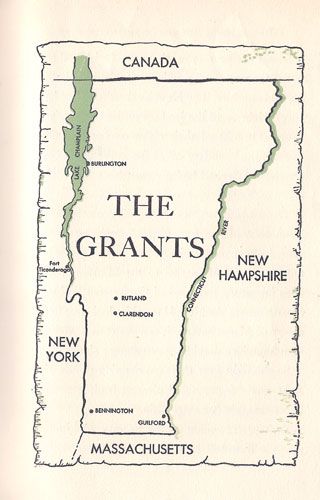In an age when the average man on the street can’t even name the Vice President, this is probably not a big deal—I always used to get Nathan Hale and Ethan Allen mixed up. I don’t know why. Perhaps because both their names have “than” in them. I know they’re both famous for a quote they made and they both had their 15 minutes of fame during the American Revolution and then disappeared off the radar. Okay, one was hanged for spying but why did the other one not have a glorious military career? They probably only got a sentence or two in my history books and may not even be mentioned in today’s books.
I say “used to” because now I have a biography for Ethan Allen, one of the Landmark Books. He’s the one who wasn’t a spy and now he’s more than just a quote (“In the name of the Great Jehovah and the Continental Congress” if you’re wondering). That’s the great thing about living books over text books and this week’s rescued book is…
 Ethan Allen and the Green Mountain Boys. Brown, Slater, and William C. Moyers (Illus.) New York: Random House, 1956. 179 pp.
Ethan Allen and the Green Mountain Boys. Brown, Slater, and William C. Moyers (Illus.) New York: Random House, 1956. 179 pp.
For our history study, we focused on the chapter of the Allen leading the capture of Fort Ticonderoga. The quote was his answering the question posed by the British Captain turning over his sword, “By whose authority have you and your mob entered His majesty’s fort?” The fort guarded the waterways formed by Lake Champlain, Lake George and the Hudson River. It was key in preventing a British attack coming south from Canada. The guns and ammunition captured were later transported by Henry Knox to Boston and caused the British to withdraw from the city. The only casualty in taking the fort may have been the captain’s pride (he had been sleeping and didn’t even have time to put his pants on).
With such great success, why didn’t Allen play a role in the rest of the war? Well the easy answer is to say he was captured and spent 30 months either on a prison barge or imprisoned in London. But even before the capture, Ethan Allen was never offered an officer’s commission. The Continental Congress actually took a dim view of the whole Ticonderoga affair. This took place in May of 1775—after the shot heard round the world but more than a year before the Declaration of Independence. Here’s a passage:
[Congress] felt it inadvisable at the time to advertise to the world that the Colonies had taken the offensive against England. Ethan was therefore stunned when a letter arrived from Congress ordering that the cannon and military stores captured at Ticonderoga be …held…so they may might be safely returned to His Majesty George the Third when the ‘former harmony’ between America and England ‘so ardently wished for’ by the Colonies could be restored.
Ethan’s plan to invade Canada was rejected (nearly 18 months later just such an attack was attempted, but failed). The Congress did authorize the organization of a regiment of Green Mountain boys under officers of their own choosing, but the older, wiser men of the territory passed over Ethan Allen for command—probably due to his actions and attitude  in the past.
in the past.
The first six chapters of the book deal with the land dispute between the New York and New Hampshire colonies over the territory that would become the state of Vermont. Ethan tried to settle the matter in court once, but things escalated to combat. Shots were fired, homes were burned, officials were harassed. In one instance a land owner with a New York patent tried to populate his holding with recent immigrants from Scotland who knew nothing of the dispute. When Ethan discovered their settlement he ordered the cabins burned, the gristmill pulled down, and the millstone smashed and thrown over a waterfall.
Ethan’s excuse for his actions was the need to keep out tenet farming and the Feudal system being imposed by Yorkers sometimes required desperate measures. He penned many articles for the local papers on “Life, Liberty, and Private Property.” Nothing I read in the book though gave me the impression that the Yorkers were imposing the same tyranny that led the colonies to declare independence from King George III, nor did I find mention that Ethan Allen was acting on behalf of the New Hampshire government.
Ethan Allen may have been a great man, his past experience made him the right man for the job of capturing Ft. Ticonderoga, but I’m not sure I would label him as a good man with the qualities of say, Gen. George Washington. Still, I’m glad for the opportunity to read about him.
You can see all my rescued books by clicking here.

No comments:
Post a Comment